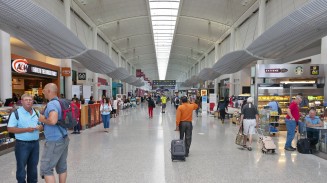Costa Rica has started issuing transit visas for migrants without documents since April, allowing more than 18,000 people to cross into the country. Officials say that the situation is being replicated in border towns throughout Latin America, as people risk their lives in perilous journeys that expose them to hunger, crime and human trafficking.
Cy Winter, the director of Border management for the International Organization for Migration (IOM), mentioned in an article released on the organisation's home page, that Costa Rica is offering the migrants something that they are in dire need of. In the case of these people, the need is to forward to one more border north.
Yolanda, a 7-month pregnant woman, and her husband are among tens of thousands of migrants from Africa and Haiti who are crossing South and Central America, trying to reach the United States. They are presently stuck in Paso Canoas, Costa Rica, awaiting the travel documents that will let them enter the country and continue their journey northward.
Yolanda, a migrant who claims to be originally from Congo, have passed through several countries in the last three months including Brazil, Peru, Ecuador, Colombia, Panama and now Costa Rica. "I hope to leave soon, so that I can see a doctor. I don't want my baby to be born on the road," she says.
The huge rise in undocumented arrivals is a logistical dilemma, and most definitely a humanitarian nightmare for the government of Costa Rica. The migrants are often paying so-called coyotes for illegal border crossings, to meet up to the breaking of ties to the state and public administration system. They are even victims of labor exploitation, that roots out from false job offers "just over the border."
Mariliana Berrios Morales, founder of the 20-year-old Rahab Foundation, told CNN concerning the migrants, that some of the women are turning into prostitution. "We are in the process of training our personnel and we are going to be working with this community directly because they have to be aware that they could be victims of human trafficking, either for slave labor, sexual slavery and other ends," said Morales.
However, the IOM and other experts believe the majority of migrants are Haitians that are pretending to be Congolese to avoid deportation since it would be too costly for most Latin American countries to fly them to Africa. "Some of the people I've spoken to claiming to be from Congo, barely know the capital including the dialects spoken in the Congo, and don't know the football jersey," said Winter.
For Haitians trying to make their way into the United States, it can be devastating to know that officials recently dismissed the advantageous benefits and easy entry that were established after the 2010 earthquake. Even if they are able to make it to the U.S. border after months of travel and hardship, the migrants, be it Haitian or Congolese, will not likely get in.
© 2023 Lawyer Herald All rights reserved. Do not reproduce without permission.
Get the Most Popular Lawyerherald Stories in a Weekly Newsletter





